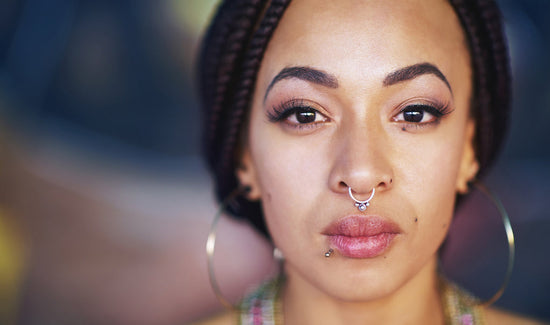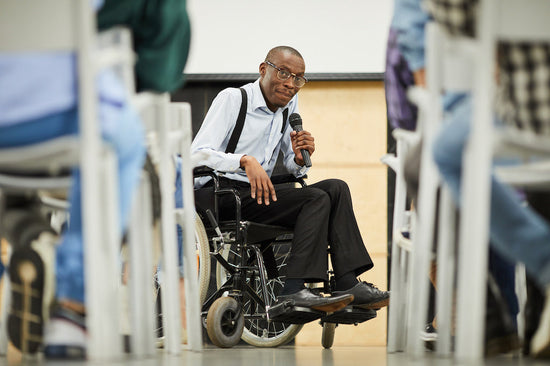
Running with anxiety and depression
Running with anxiety and depression became the friend I could talk to when all my friends were sick and tired of hearing how sad I was about this stupid guy. It was always there for me, rain or shine, hot or cold, sad or happy. | Photo Credit: @Andrey Burmakin/ Adobe Stock
Running with anxiety and depression
"What is needed, rather than running away or controlling or suppressing or any other resistance, is understanding fear; that means, watch it, learn about it, come directly into contact with it. We are to learn about fear, not how to escape from it.”
Hit the ground runnin’
Stomping into my room, I walked into my closet, bigger than most of my apartment, determined. In the back of the closet sat a pair of black and white Nikes. Furious, I grabbed the cross trainers from the shelf in which they were perched, plopped to the floor, untied the knots like I was an experienced Girl Scout and shoved my left foot, then my right into the shoes. Pulling myself off the floor, I continued thudding all the way to the kitchen, grabbed my keys, and barged open the front door like it was an emergency. Practically running to my car, I was more than ready.
Before I decided to go running that night, I decided to buck up and text this guy that I was obsessed with for multiple stupid years. I thought it out for hours on my hand-me-down couch, nervous about choosing just the right words. What could I say to make him fall in love with me? What would seem not desperate, but also sexy? After contemplating the situation, I pulled my phone out, searched for his name through my contacts and typed.
“What’s up?”
I felt pretty good about that one. I can’t tell you if I heard this line from a book or if I made it up on my own. There’s no way he wouldn’t respond. I decided to turn my phone over, screen facing the cold leather couch. If he didn’t text back, I wouldn’t know, I thought. I lifted myself off from the sitting position and walked to my bathroom. He’ll text back, I thought. I have to give him a few minutes. So, I took my time in the restroom, washed my hands, and returned to the couch. I wouldn’t look.
I looked. Nothing.
The familiar ping of nervousness rose in my stomach. Fuck. Not this feeling again. I never felt it unless I was thinking about him, which should’ve given me another hint that this situation and relationship was toxic. I never felt good about the relationship unless I was with him, and even then, I was always nervous, sad, or intoxicated figuratively and literally, all depending on how he treated me. I couldn’t take this anymore! Tonight, at least.
It was a little over a mile to Brown Park from my apartment building. Brown Park was small, having only a one-mile hybrid loop of concrete and trail into an arborous area leading to a pond of furious geese swimming and begging for bread. I jumped out of my shitty champagne-colored Ford Escort, which was blasting some Kanye West song, and plugged in my earphones to continue my music therapy. It was May, and the weather was different every day in springtime in Kentucky. This particular day was 80 and humid, so I was sweating already as I walked to the beginning of the running trail. I had walked here before with friends but never attempted a long-distance cardio session.
Growing up, I had always been a mediocre athlete. Trying my hand at every sport – softball, cheerleading, dance, basketball, tennis – I could not find one that I was considered good at by any coaches’ standards. I ran a swift thirteen-minute mile in gym class, which passed the test, but I was never in first, second, even third place. At twenty-four, I worked out most every day – taking a long walk during lunch, nothing excruciatingly hard or sweat-breaking. I always admired long-distance runners with their lean arms and legs and cool-without-trying attire – and to be perfectly honest, I was jealous of their seemingly effortless weight control.
Running with my anxiety and depression is cathartic for me, but it comes with its own share of dangers. In July 2018, psychology student Mollie Tibbetts, 20, went missing in Brooklyn, Iowa, after going for a run. Authorities charged Cristhian Bahena Rivera, 24, with her murder. Her whole family, hometown, and investigators joined forces to find the University of Iowa student. Her photo was everywhere in town–on yard signs, store windows, and T-shirts. She was gone for weeks. A reward for information on Mollie’s whereabouts reached nearly $400,000. Police got thousands of tips and even looked into Tibbetts’ data from her fitness tracker, which didn’t exist when I was in school. Rivera told police he saw Tibbets running and pursued her in his vehicle, then parked the car and started running after her. Mollie was found in a cornfield.
"Running with my anxiety and depression is cathartic for me, but it comes with its own share of dangers."
Several weeks after Tibbetts’ death, another student–this time at Iowa State–was found dead. Celia Barquin Arozamena, 22, was a civil-engineering student and a champion golfer who won the European Ladies’ Amateur Championship, representing Spain, according to an article by Slate. Arozamena also set out to exercise on that early morning at Coldwater Golf Links in Ames, Iowa. A man attacked her somewhere around the ninth hole, according to the article. Staff found her body in a pond, her golf bag lying on the fairway nearby. She had been assaulted and stabbed multiple times in the head, neck, and torso. Police caught the suspect, Collin Daniel Richards, 22, later that afternoon. He was a homeless addict who had been living in a camp close to the course.
Something deep inside me made me make the decision that took me out to Brown Park that day. I cannot tell you if the Gods of Olympus pushed me out of my house that day and into that park an hour from my home, but I can tell you that I heard something telling me to run. My soul knew it. My body knew it. My anger and rage at not being good enough for that boy, my parents, my job was palpable, and I was running, running away from those feelings, although not for good – yet.
A hard-hitting rap song hit my ear waves and something powerful moves through my body and eventually moved both feet forward, and sooner than I knew, I was running. Flying. I thought I was flying. All my racing thoughts left my head and I was blank, totally blank. I focused on foot moving forward, gravel shuffling underneath them with each crunch crunch crunch. What a satisfying sound! Faster and faster I picked up, racing myself, and pounding out each of the bad thoughts. Feeling so powerful, I kept running. I ran for loops and loops around the park. Miles and miles. I couldn’t stop. I couldn’t physically get my body to stop, with more endurance than I ever had in my life. I was the star of a fucking Nike commercial. When the dark began swallowing the trees, I knew I have to go home. I walked to my car, legs shaking and feeling on top of the world.

I got home, stripped out of my sweaty black and white running shorts and tank with a built-in sports bra after slamming the door behind me and headed to my bathroom. I flipped over my phone once again and laid it on the white marble counter. I couldn’t bear to see that there isn’t a notification. I leaned over the tub and pull the nozzle all the way to the right for hot water. I needed it as hot as it would go. Shampooing my hair and then washing my body, I finished my shower in fifteen minutes. I turned off the spout, grabbed my towel and straddled one foot out of the tub, then the other onto my grey, fuzzy bath mat.
Standing there, dripping, I turned over the phone, curious but also knowing that the probability of him texting me back was next to nothing. To my surprise, one-word stared back at me after his name.
“Hey.”
Running became the friend I could talk to when all my friends were sick and tired of hearing how sad I was about this stupid guy. It was always there for me, rain or shine, hot or cold, sad or happy. But, I wasn’t always depressed. As my therapist says, it comes in waves. I tried drawing anxiety and depression as a means of self-therapy, but I felt nothing like I did when I was running.
Anxiety and depression are friends that like to show up at different times in my life. Worry, guilt, and panic plagued me even as a little girl. It would sneak up as a pit somewhere below my breasts as I was about to head into a birthday party or nausea that almost handicapped me en route to school in the morning. Before tests, after tests, before gym class and after, I was always worrying. Worrying mostly about what others thought of me. Questions sprinted through my head at pretty much every ring of the bell. Was I too smart? Too tall? Too over-zealous about fitting in? But I couldn’t just go on, I had to fix them somehow.
Running with anxiety and depression eased my symptoms, yet it’s also increased them. In 2016, three female runners were killed in broad daylight. Thirty-one-year-old Alexandra Nicolette Brueger was shot four times in the back while running on her daily 10-mile run on a dirt road fifty miles northwest of Detroit. Three days later, thirty-year-old Karina Vertrano was raped and killed on a Queens park trail. That same week, twenty-seven-year-old Vanessa Marcotte was found in the woods near her parent’s house, according to Runner’s World.
"Running with anxiety and depression eased my symptoms, yet it’s also increased them."
Shouldn’t running help and not hurt my anxiety?
Anxiety stalked me well into my college years. It made me nervous to talk to guys at parties without a red plastic cup of jungle juice. I had so much anxiety it even prevented me from studying for tests or writing twelve-page research papers until the night before it was due, thinking that the task was too daunting to take on at all. The burly bouncers at my favorite college bar down the street from the house I rented with four of my girlfriends, knew my name. How could they not notice me? I was a drunk fake blond whose name was known by the bouncers at Tin Roof but never by professors at the University of Kentucky.
The shame of my anxiety began when I was in kindergarten when I thought I was a total freak because I did not know how to enter a room with ease and thought everyone else around me did. Often, I begged my dad not to make me go to a birthday party. I was an only child with not another person in the world to lean on in social situations.
“She’s your friend, right? Just go up to her and say ‘hi,’” he told me before one skating-rink themed eleventh birthday.
“It’s not that easy, Dad!” I said back. After being forced to attend the party, I knew that I shouldn’t have feared my friends. They weren’t scared of me. I felt shame for not being normal, and I felt shame because I felt shame for not being normal, and that second shame informed everything. I could not take a test without being terrified; I was not good enough. I could not try a sport without the shame that others could do better. And no one ever came along and coached me about how to cross over the innumerable membranes between myself and everyone else. No one told me that I was normal in my abnormality. No one told me that I had nothing to be ashamed of. So, I spent most of my life seeking validation from anyone who would give it to me.
Like that boy that I was obsessed with for four years. The one who would never text me back. The same one who told my friends that he didn’t love me, and the one I had sex with after he said those words. I wanted so badly for him to want to know everything about me and to love everything about me. But he didn’t. He didn’t give me the validation that I needed. And my dad, who wanted a boy all along, but instead was given a girl, and who never knew what to do with. Treating me like a boy, he gave me tough love. And the need to please him made me realize that I was never going to be good – or good enough. He also didn’t give me any validation.
Depression never crossed my mind. The feeling of sadness at the end of the night as I climbed into bed alone with my makeup still on, as well as my dress, felt normal at the time. Even when I climbed into bed, and I wasn’t alone, I thought the down feeling after he left the next day was completely normal. I was just hungover. I guess I’m not the only one who suffered with these things.
"No one told me that I was normal in my abnormality. No one told me that I had nothing to be ashamed of."

The real dangers of running while female
Running was something that made me look forward to something. But I wasn’t always happy, and running with anxiety wasn’t a cure-all. I spent many years trying to find the right combination of running, therapy and prescriptions to mellow myself out enough that I never felt like I was going to give up. Two years later, I have a boyfriend, two dogs and what, I would say, a good life. I’m not always happy, but I’m not always sad, and I think that’s what matters. It sneaks up on me, though, and reminds me that I’ll never be normal. I’ll always be a sad, anxious, socially awkward girl, and it’ll never change.
There are real dangers of running while female, according to the Boston Globe. A 2017 article profiled a Boston Marathon runner that did it as an act of defiance. Ashley McNiff’s best friend, Vanessa Marcotte, went out for a run and never came back in 2016. Marcotte was murdered and found in the woods off a two-lane road, a half-mile from her mother’s home.
McNiff ran the Boston Marathon after her friend died because, she told the Globe, “I’m not going to let what happened dictate my life.”
According to an article in Runner’s World, 63 per cent of female runners choose routes where they figure it’s unlikely they’ll be harmed, and 60 per cent limit their runs to daylight hours. More than 70 per cent of women carry a phone on them and let someone know their route and when they’ll be back. And 54 per cent of women say they walk out the door concerned that will be assaulted during a run. My mother even reminds me to bring pepper spray while running. I do what she says, and I’m not alone–21 per cent of women runners carry it, according to the Runner’s World survey.
“I want to get to a place where women can live free from the fear of violence. I want to go for a run at 5 in the morning and not worry about anything bad happening to me,” McNiff said in the Globe article.
“That’s my dream, but I know that’s not the reality. But I’m not going to stop running. I’m not going to stop doing the things that I love.”
Running with anxiety should be helpful, not harmful
Running with anxiety and depression should be helpful, not harmful. Running should be a stress relief, like what it does for my psyche, although I even have anxiety working out because I feel like I need to be on alert.
Especially when I’m not working out, the wave of anxiety crashes over me, leaving me submerged, like the moment I crossed the finish line and met my running goal for 2015. It was a 40-degree, cold and rainy day in March, and I had made plans with my five of my closest friends, including one I ran with that day, to go to the Louisville St. Patrick’s Day Parade. The day started with running breathlessly through the streets of Anchorage and through Tom Sawyer Park would continue with ten Guinness’s on a shutdown Bardstown Road with half of the city decked in Kelly green for the celebration of Irish tradition.
When I walked in my door, my black Labrador mutts, Molly and Max, greeted me with the kind of excitement only dogs can muster. I patted their twin crowns and made my way to the back of the condo, to my welcoming king-sized bed. I only meant to lie there for a minute. Trying to pick myself up off the bed to take a shower, I only had a short amount of time before meeting my friends who were already starting to drink before the parade.
I should’ve been elated. I had just finished my running goal of the year, and I had made a ten-minute better personal time goal than the year prior. But something was wrong. I couldn’t make myself get out from under the covers. It hadn’t been like this for a while. For years, even. I wanted to start bawling, but nothing came out. I couldn’t answer my internal burning question: What was wrong? Finishing a race should come with a sense of joy, but all I felt was sorrow. I pursued this goal for months and months, I accomplished what I set out to do, and yet, I still felt sad.
My iPhone buzzed every couple of minutes with excitement from all my friends I planned to meet up with.
“So excited to see everyone!” Read one.
“When do you think you’ll be here?” Read another.
A panic attack; anxiety rushing over me. I couldn’t not answer, even though every part of me just wanted to turn over and close my eyes. I had to answer the texts. These were my friends. And I gave them my word I would go. I never did anything anymore, really. I should love my life, I should be happy. I should be out celebrating.
Instead, I reached over and grabbed the phone laying on the wooden nightstand, unplugged the device from its charger and swung it into both hands above my face, lying on my back. I swiped my right thumb from left to right over the bottom of the screen.
“Hey, I hate to do this, but I’m not coming. Have a great time, and I’ll catch up with you later!” I texted the group. I rolled over and faced the wall, embarrassed and sad. I closed my eyes and drifted off into a restless sleep.
Some days, I don’t want to go running. I meticulously scrub the kitchen, bedrooms and two small bathrooms in my second-level condominium like I have a cleanliness obsession, and I still didn’t want to go running. Anything but running! It could be printed on a T-shirt. Days like those, when I don’t want to leave my condo because I’m lazy, or sad or exhausted, I try to remind myself what running has done for me. It taught me how to live and how to feel. How to be a person I never thought I would be – and how to be happy.
I’m hitting the asphalt, and like a drug that I can’t tear myself away from, I become high and happy. I haven’t run for a while and I can feel my calves ache as each foot strokes the hard ground. I’m grossly exhausted from a day of making decisions: for work, for life, for relationships. I turn the volume up on my iPhone to block out the bad thoughts.
N-now th-that that don’t kill me Can only make me stronger, I know I got to be right now ‘Cause I can’t get much wronger.
Kanye pushes my feet faster until they feel like they are no longer on the ground. Self-doubt, negative self-talk was left at home and all I can think was how strong I am.
How beautiful I am.
And how smart I am.
I begin to pant and feel my stomach tighten as I hit the first half-mile mark around Brown Park. Peering up at the brown and orange leaves on the maple trees, I have to tell myself not to quit. Just because you’re tired, doesn’t mean it’s the end.
Push through, without fear.
And so, I do.











